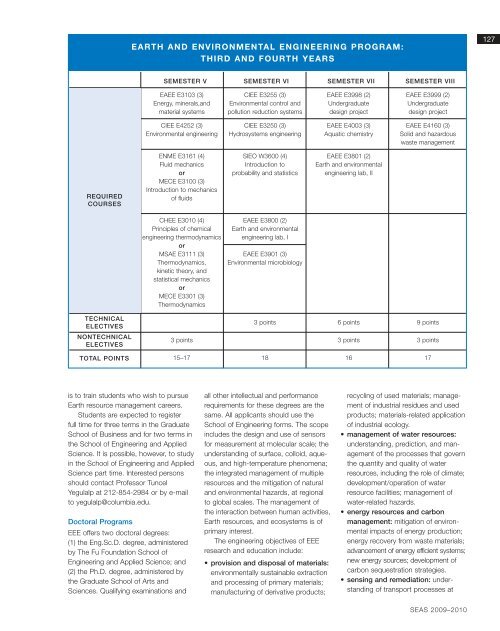2009-2010 Bulletin â PDF - SEAS Bulletin - Columbia University
2009-2010 Bulletin â PDF - SEAS Bulletin - Columbia University
2009-2010 Bulletin â PDF - SEAS Bulletin - Columbia University
Create successful ePaper yourself
Turn your PDF publications into a flip-book with our unique Google optimized e-Paper software.
EARTH AND ENVIRONMENTAL ENGINEERING PROGRAM:<br />
THIRD AND FOURTH YEARS<br />
127<br />
SEMESTER V SEMESTER VI SEMESTER VII SEMESTER VIII<br />
EAEE E3103 (3) CIEE E3255 (3) EAEE E3998 (2) EAEE E3999 (2)<br />
Energy, minerals,and Environmental control and Undergraduate Undergraduate<br />
material systems pollution reduction systems design project design project<br />
CIEE E4252 (3) CIEE E3250 (3) EAEE E4003 (3) EAEE E4160 (3)<br />
Environmental engineering Hydrosystems engineering Aquatic chemistry Solid and hazardous<br />
waste management<br />
REQUIRED<br />
COURSES<br />
ENME E3161 (4) SIEO W3600 (4) EAEE E3801 (2)<br />
Fluid mechanics Introduction to Earth and environmental<br />
or probability and statistics engineering lab, II<br />
MECE E3100 (3)<br />
Introduction to mechanics<br />
of fluids<br />
CHEE E3010 (4) EAEE E3800 (2)<br />
Principles of chemical Earth and environmental<br />
engineering thermodynamics engineering lab, I<br />
or<br />
MSAE E3111 (3) EAEE E3901 (3)<br />
Thermodynamics, Environmental microbiology<br />
kinetic theory, and<br />
statistical mechanics<br />
or<br />
MECE E3301 (3)<br />
Thermodynamics<br />
TECHNICAL<br />
ELECTIVES<br />
NONTECHNICAL<br />
ELECTIVES<br />
TOTAL POINTS<br />
3 points 6 points 9 points<br />
3 points 3 points 3 points<br />
15–17 18 16 17<br />
is to train students who wish to pursue<br />
Earth resource management careers.<br />
Students are expected to register<br />
full time for three terms in the Graduate<br />
School of Business and for two terms in<br />
the School of Engineering and Applied<br />
Science. It is possible, however, to study<br />
in the School of Engineering and Applied<br />
Science part time. Interested persons<br />
should contact Professor Tuncel<br />
Yegulalp at 212-854-2984 or by e-mail<br />
to yegulalp@columbia.edu.<br />
Doctoral Programs<br />
EEE offers two doctoral degrees:<br />
(1) the Eng.Sc.D. degree, administered<br />
by The Fu Foundation School of<br />
Engineering and Applied Science; and<br />
(2) the Ph.D. degree, administered by<br />
the Graduate School of Arts and<br />
Sciences. Qualifying examinations and<br />
all other intellectual and performance<br />
requirements for these degrees are the<br />
same. All applicants should use the<br />
School of Engineering forms. The scope<br />
includes the design and use of sensors<br />
for measurement at molecular scale; the<br />
understanding of surface, colloid, aqueous,<br />
and high-temperature phenomena;<br />
the integrated management of multiple<br />
resources and the mitigation of natural<br />
and environmental hazards, at regional<br />
to global scales. The management of<br />
the interaction between human activities,<br />
Earth resources, and ecosystems is of<br />
primary interest.<br />
The engineering objectives of EEE<br />
research and education include:<br />
• provision and disposal of materials:<br />
environmentally sustainable extraction<br />
and processing of primary materials;<br />
manufacturing of derivative products;<br />
recycling of used materials; management<br />
of industrial residues and used<br />
products; materials-related application<br />
of industrial ecology.<br />
• management of water resources:<br />
understanding, prediction, and management<br />
of the processes that govern<br />
the quantity and quality of water<br />
resources, including the role of climate;<br />
development/operation of water<br />
resource facilities; management of<br />
water-related hazards.<br />
• energy resources and carbon<br />
management: mitigation of environmental<br />
impacts of energy production;<br />
energy recovery from waste materials;<br />
advancement of energy efficient systems;<br />
new energy sources; development of<br />
carbon sequestration strategies.<br />
• sensing and remediation: understanding<br />
of transport processes at<br />
<strong>SEAS</strong> <strong>2009</strong>–<strong>2010</strong>







